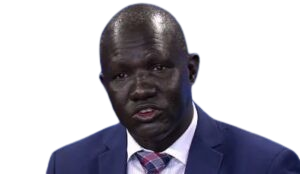The recent appointment of Adut Salva Kiir as Senior Presidential Adviser for Special Programs has triggered a storm of debate in South Sudan. Some view it as the long-awaited corrective to the wrongs of President Kiir’s administration. Others dismiss it as an attempt to undermine the perceived heir, Dr. Benjamin Bol Mel. At a more basic level, Adut’s appointment fits a familiar pattern: the promotion of children of certain senior SPLM leaders, while the children of figures like John Garang, Kerubino Kuanyin, William Nyuon, and others remain conspicuously absent.
But appointments in Juba seldom follow logic. In Kiir’s South Sudan, consistency is folly, and it is pointless to search for principle in the exercise of presidential patronage. For my part, I care little about whether Adut Salva Kiir holds office. She has no power and cannot change the course of this troubled nation. My concern lies elsewhere—with the public statements of two men I deeply respect: Ateny Wek Ateny and Gen. Aleu Ayieny Aleu.
The State Is Not Property
Ateny’s “Wun-Weng” analogy, equating the state with a private estate, revealed a fundamental misunderstanding. The state is not owned; it is the collective will of a people to live together, while government is a delegated authority to manage that collective power. That is why officials are called public servants. To imagine otherwise is to mistake public office for private possession—a mistake that lies at the root of South Sudan’s political malaise. Ateny’s words, I believe, were a slip of enthusiasm, but they nonetheless exposed a pervasive problem: the ownership mindset of our leaders.
The One-Teat Cow
Gen. Aleu’s now-famous “One-Teat Cow” analogy has drawn laughter, but it deserves deeper scrutiny. His point—that our elite quarrels resemble a fight over a single teat—was vivid but profoundly flawed.
First, the state is not a cow to be milked. It is more accurately a shepherd. The real producers of wealth are the people—the farmers, herders, and citizens—who sustain the nation. The state exists to protect and guide them, not the other way around. To reverse this relationship is to see the state as a heap of resources to be looted, an error that has bled South Sudan dry.
Second, even if we grant Aleu’s metaphor, the logic collapses. At independence, South Sudan had many “milking cows”—abundant oil, fertile land, and untapped resources. Today, through misrule, most have perished, leaving perhaps one feeble cow with one teat. But are South Sudanese condemned to this fate? Absolutely not. People who truly own their cow can sell it, slaughter it, or buy more. They are not prisoners of scarcity unless they lack imagination. To suggest otherwise is to caricature South Sudanese as savages trapped in endless quarrel, which is neither accurate nor fair.
Finally, Aleu’s analogy reflects an elitist worldview: that the crisis of South Sudan boils down to competition among a few men over who gets to drink from the teat of state. This view trivialises our national tragedy into an elite quarrel while millions suffer. For nearly two decades, since the 2005 Comprehensive Peace Agreement, this mindset has dominated politics—and it has driven South Sudan to the abyss.
A Call for a New Imagination
The truth is that South Sudan’s problems are not reducible to one cow or one teat. They are systemic, multifaceted, and deeply entrenched. They cannot be solved by satisfying the egos of a few at J1. They require a new imagination of the state—not as a private beast to be milked, but as a public shepherd, guiding and protecting the people who are the true source of wealth and power. South Sudan’s crisis is not about who gets to milk the cow. It is about reclaiming the state for its rightful owners: the people. Until this inversion is corrected, no appointment, no cow, no teat will save us.
The writer, Abraham A. Awolich, is a member of the People’s Coalition for Civil Action (PCCA)—a South Sudanese civil rights movement, and a PhD student in Sustainable Development Policy, Economics, and Governance at the University of Vermont. He is a Gund and L4E Fellow. He can be reached at aawolich@uvm.edu.
The views expressed in ‘opinion’ articles published by Radio Tamazuj are solely those of the writer. The veracity of any claims made is the responsibility of the author, not Radio Tamazuj.




